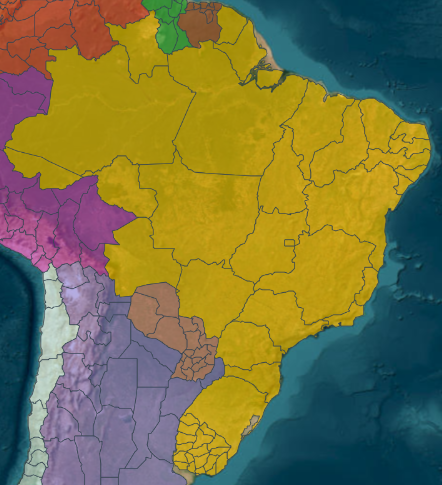Empire of Brazil
The Empire of Brazil is a large nation in South America, bordering Gran Colombia, the Kingdom of Peru, and the Kingdom of Argentina.
Structure
The Empire consists of four branches of the federal government. These are the executive, legislative, judicial, and monarchy.
History
During the European wars against Napoleon, the Portuguese royal family escaped to their colony of Brazil. Following the disposition of Napoleon in 1815, King John VI elected to remain in Brazil. However, the Portuguese government in Europe demanded his return, and he did so in 1821, leaving Prince Pedro behind as regent. Pedro subsequently declared Brazil's independence from Portugal in 1822 with himself as Emperor.
In order to secure and alliance with the Kingdom of America, Pedro agreed to the marriage of his sister, Ana to Crown Prince William. The two were married in 1825.
Emperor Pedro I attempted to return to Portugal in 1831 in order to fight for his daughter's claim to the throne against his brother. However, King Augustus II and King Jean I of Haiti attempted to persuade him against it, as he had agreed to the Continental Ordinance seperating the interests of Europe and the Americas. It was believed that Brazil was a great regional power and was needed for a stable region. Pedro eventually decided to stay, had his daughter brought to Brazil, and renounced his claims to the Portuguese throne. He reinstated the constitution and appointed his previous political rival turned friend Jose Bonifacio de Andrada e Silva as the first Prime Minister.
Pedro would stay in Brazil, mentoring his son, also named Pedro, to succeed him. When the younger Pedro turned of age in 1848, the elder abdicated and went into self appointed exile in the Caribbean. One of his final acts was overseeing the official annexation of Santa Cruz during the partitioning of the Charcas region in 1846.
In 1863, after Haiti conquered the territory of French Guyana, Brazil accepted the offer to purchase the land.
In 1864, Brazil entered into war with the Republic of Paraguay. Brazil had cracked down on the republican ideologies of the Ciplatine region, and so Paraguay declared war in support of the region. Brazil was joined by Argentina. Though they possessed superior numbers, the war was long and arduous for Brazil. The death toll of troops forced the desegregation of the military with freed slaves, thus emboldening the emancipation and abolitionist movement growing in Brazil. The war ended with a Brazilian and Argentine victory in 1870. Following the war, Pedro II signed the Golden Law into effect, ending slavery in Brazil.
A coup attempt occurred as a response to the Golden Law in 1878 that saw Pedro II overthrown in favor of a republic. The coup was repordedly supported by Gran Colombia. Pedro was offered asylum by King Robert I of Argentina, and was accepted. With public support from the Brazilian people and military support for allies, Brazil was able to reinstate the monarchy following a monarchist resistance.
However, Princess Isabel, heir presumptive to the Imperial Throne, refused to return to Brazil and took refuge in Brittany. Pedro was succeeded by his grandson, Pedro III, son of the elder Pedro's second daughter Leopoldina, in 1891.
Emperor Pedro III proved to be ineffective, as the republican coup had a deep effect on his mental state. A quiet coup was made in 1898, replacing Pedro with his brother Augusto. Pedro lived out the rest of his days in house arrest in a mental asylum.
Upon becoming emperor, Augusto, still heartbroken over the loss of his wife Maria Louise, ordered the construction of the Memorial de Maria. The mausoleum and memorial became one of the most visited sites in all of Brazil, as lovers and mourners alike journey to pay their respects to the princess.
Luis of Orleans-Braganza, son of Princess Isabel, began to openly pressed his claim to the throne in 1908 following the renouncement of his elder brother's claim. Though Luis attempted to garner support from King Elias I of Argentina, the latter declined. Augusto gained the support of King John II of Peru, along with the territory of Acre, during a royal marriage between the two houses.
With the onset of the Great War, Augusto agreed to the Congress of Columbia to remain neutral, believing entering the conflict would exacerbated the dispute between the rival factions of government.
In 1919, Brazilian volunteers fought in the Peruvian Civil War. This force encompassed volunteers raise by Prince Philip, who made himself a Peruvian general.
In 1922, Augusto passed away, being succeeded by his eldest son, Leopold I.




Comments